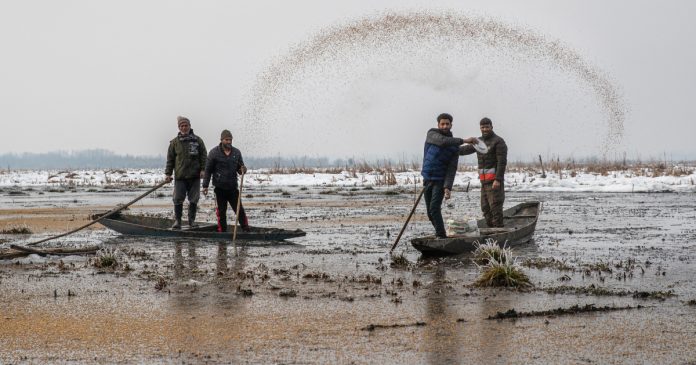[ad_1]
Wildlife official Ghulam Mohiuddin Dar and his colleagues are busy this winter in Indian-administered Kashmir, rowing out regularly into a frigid wetland to scatter grain to feed the birds.
They feed these migratory birds to keep them from starving as weather conditions in the disputed Himalayan region deteriorate and temperatures plummet to minus 10 degrees Celsius (14 degrees Fahrenheit).
Vast paddy fields and apple orchards are blanketed in snow after two heavy snowfalls since December. Scores of wetlands and lakes, including parts of famed Dal Lake, have frozen.
The cackles and cries of hundreds of thousands of birds that visit the Kashmir region during their winter migration have long been a welcome sound for the region’s inhabitants.
They arrive from as far away as Eastern Europe, Japan and Turkey to feed and breed in the wetlands nestled between the region’s mountain peaks and plateaux.
“They are our guests,” Dar says on a frigid day as he scatters grain at bird feeding points on the Hokersar wetland.
Officials say at least 700,000 birds have flocked to Kashmir in the past two months and they expect more to arrive as temperatures improve in February.
In recent decades, the numbers of visiting birds have declined, which experts say is due to a combination of climate change and urban development.
They say construction around wetlands, accumulated rubbish and the changing Himalayan climate are robbing the birds of their traditional watering holes and nesting areas.
According to a recent study by the University of Kashmir, the Hokersar wetland shrank from nearly 19 square kilometres (7 square miles) in 1969 to 12.8 square kilometres (5 square miles) today.
But the Indian-administered region’s tense security situation has made addressing environmental issues harder in the famed Kashmir Valley, a vast collection of connected wetlands and waterways known for idyllic vistas and flower-filled meadows.
Environmentalists are urging residents to also feed to the birds in the freezing conditions.
“It’s not just our official duty to feed them but also a directive from God,” Dar said.
[ad_2]
Source link











